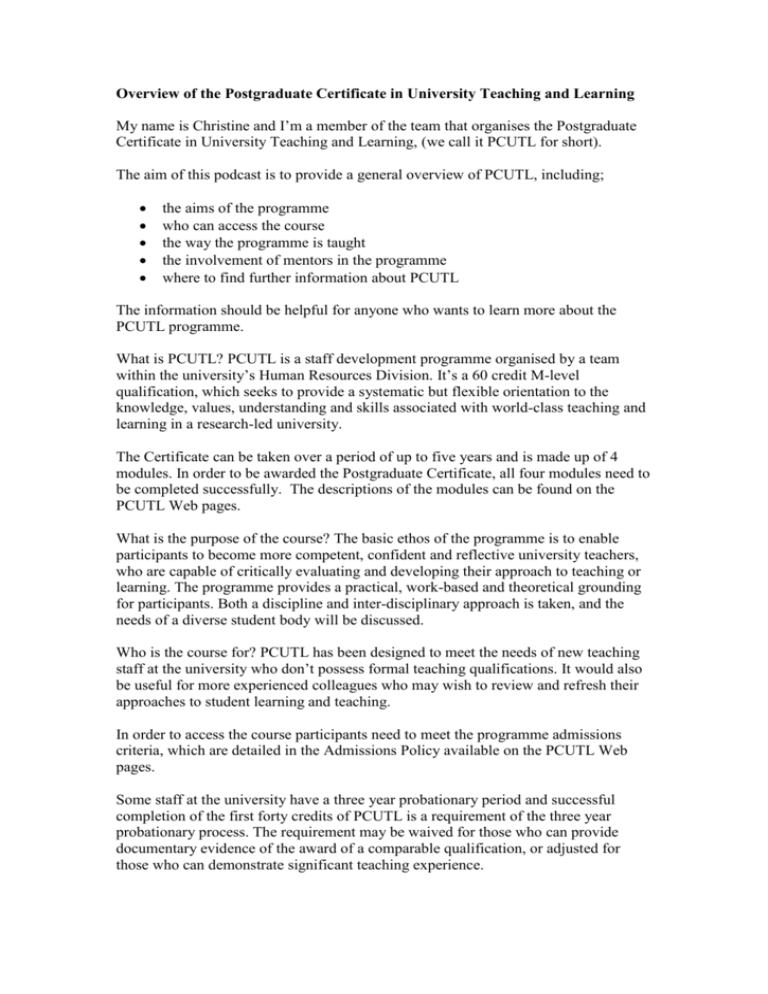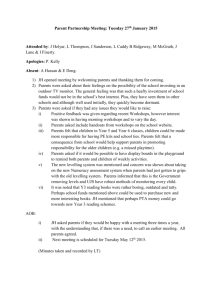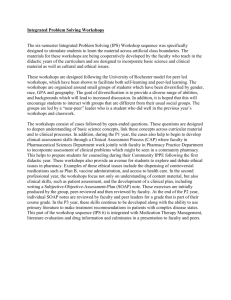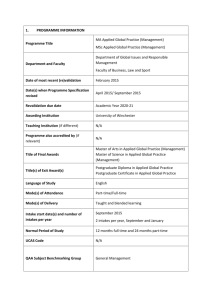Transcript of audio clip
advertisement

Overview of the Postgraduate Certificate in University Teaching and Learning My name is Christine and I’m a member of the team that organises the Postgraduate Certificate in University Teaching and Learning, (we call it PCUTL for short). The aim of this podcast is to provide a general overview of PCUTL, including; the aims of the programme who can access the course the way the programme is taught the involvement of mentors in the programme where to find further information about PCUTL The information should be helpful for anyone who wants to learn more about the PCUTL programme. What is PCUTL? PCUTL is a staff development programme organised by a team within the university’s Human Resources Division. It’s a 60 credit M-level qualification, which seeks to provide a systematic but flexible orientation to the knowledge, values, understanding and skills associated with world-class teaching and learning in a research-led university. The Certificate can be taken over a period of up to five years and is made up of 4 modules. In order to be awarded the Postgraduate Certificate, all four modules need to be completed successfully. The descriptions of the modules can be found on the PCUTL Web pages. What is the purpose of the course? The basic ethos of the programme is to enable participants to become more competent, confident and reflective university teachers, who are capable of critically evaluating and developing their approach to teaching or learning. The programme provides a practical, work-based and theoretical grounding for participants. Both a discipline and inter-disciplinary approach is taken, and the needs of a diverse student body will be discussed. Who is the course for? PCUTL has been designed to meet the needs of new teaching staff at the university who don’t possess formal teaching qualifications. It would also be useful for more experienced colleagues who may wish to review and refresh their approaches to student learning and teaching. In order to access the course participants need to meet the programme admissions criteria, which are detailed in the Admissions Policy available on the PCUTL Web pages. Some staff at the university have a three year probationary period and successful completion of the first forty credits of PCUTL is a requirement of the three year probationary process. The requirement may be waived for those who can provide documentary evidence of the award of a comparable qualification, or adjusted for those who can demonstrate significant teaching experience. Who organises the course? The programme is led by a Senior Lecturer who has many years of experience of teaching and supporting learning in higher education. Like other courses at the university, the programme has a Board of Studies. The PCUTL Board is made up of staff from several of the university’s Schools and divisions, and so a wide range of perspectives and involvement in learning and teaching is brought to the management of the programme. Again, like other courses at the university, the programme has a Staff/ Student Panel, where the views of students are represented and feedback on the programme can be provided to the programme organisers. How is PCUTL taught? Modules 1, 2 and 3 are taught via workshops, whilst module 4 is largely self directed and project based. The number of participants in each cohort is quite small and so there is a lot of opportunity for interaction with other participants and the workshop leaders. In addition to the workshops, participants have access to Learning Central, which is the university’s Virtual Learning Environment. Within Learning Central participants can access module announcements, programme information such as handbooks, and links to interesting articles or papers, amongst many other things. Where are the workshops taught? The workshops take place on the university campus and participants get lots of notice regarding the dates, times and locations of the workshops. The workshops are held on weekdays, during the day. Assessment - Details of the ways in which participants work will be assessed can be found in each of the module descriptions that are available on-line. The assessments are in the form of coursework and there are no examinations in PCUTL. The role of mentors- Each participant in the programme will be allocated a mentor from the School or Division in which the participant works. Mentors are nominated by the participants’ Head of School or Division and mentors play a very important role in the programme. Mentors help participants to translate their learning on PCUTL into a discipline or subject specific context. I hope you have found this brief overview of PCUTL helpful. If you would like further information about PCUTL please view the programme web pages, which you’ll have found already as you’ll have accessed this podcast from there. If you’d like to contact a member of the programme team you’re very welcome to call or email. Our contact details are on-line. Thank you very much for taking the time to listen to this overview – we hope that you’ve found it helpful. And please remember, if you have any questions about PCUTL, you’re very welcome to contact the PCUTL team.











